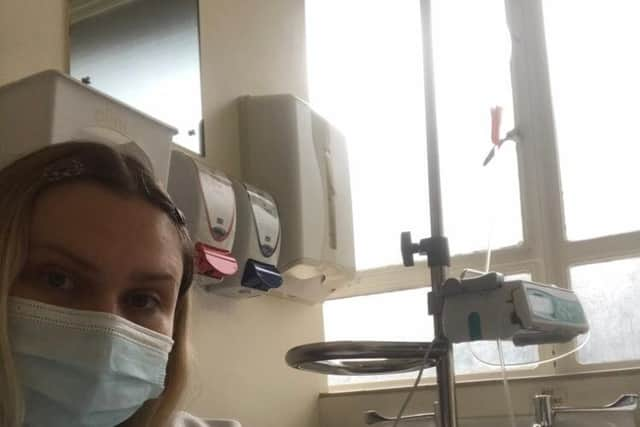'Not being able to walk is a massive fear': How multiple sclerosis changed the life of a Farnley woman
and live on Freeview channel 276
Sarah Emily Scarce, 29, still tries to remain active but lives with multiple sclerosis (MS) and the condition has placed limits on what she can do both at work and in her social life.
She was diagnosed with relapsing remitting MS in October 2020 and has been forced to live with caution to avoid relapses, which involve an attack of both new and old symptoms.


Advertisement
Hide AdAdvertisement
Hide AdSymptoms of the condition include difficulty with vision, mobility and cognitive processes and there is currently no cure.
"When you have MS, every day can be different," she said. "One day, you might be able to walk really far and feel loads of things and go to the pub or do whatever you want to do. Some days, your body will shut down and it will be in pain.
"If I do too much, I can relapse, which I wouldn't want to happen."
Sarah works as a virtual sales team advisor for student accommodation provider Unite Students but now works from home as her mobility has deteriorated.
Advertisement
Hide AdAdvertisement
Hide Ad"It's really frustrating," Sarah explained. "I think sometimes, I have to remember that I can't do everything that I did before.
"At work, I struggle if I'm in a meeting with a lot of people saying different things. I would struggle to take information in and get my words out, and my vision is also affected.
"If I'm walking fast or if it's quite warm and I get overheated, my vision can get really blurry.
"It affects all parts of my life because it affects being able to go out and socialise if I'm not feeling too good and also working, and even stupid things like doing the housework. I really struggle to work full-time and do that because I just fatigue."
Advertisement
Hide AdAdvertisement
Hide AdThe official diagnosis was given to Sarah in October 2020 and such is the extent of the uncertainty surrounding MS, she has been left with fears over her future.
Also in news: Former Leeds United player supports team-mate's multiple sclerosis battle with mammoth cycle fundraiser
"When you have MS, your immune system is severely suppressed," she said. "That means you're more prone to infections and a lot of the treatment for MS can suppress your immune system even more.
"I think it's always a worry for me that I'm going to catch an infection and get really poorly with it. Not being able to walk is a massive fear. No one wants to not be able to walk or be able to look after themselves.
Advertisement
Hide AdAdvertisement
Hide Ad"I'm 29 now and I want to have a family, it's things like that. If I have kids, I want to be able to run around after them and be okay for that. When you have MS, it's just so uncertain, you don't know if it's going to get worse tomorrow or in a few years, or it might not get worse."
Communication has been key to Sarah's coping strategy and she is a member of a support group containing others in the United Kingdom under the age of 35 with MS.
MS is one of the most common causes of disability in young adults, although Sarah has encountered surprise from medical professionals over the fact she has MS as a 29-year-old.
"I think there needs to be more awareness of it because what I've realised since I've been diagnosed is that there is actually a lot of young people living with it," she said. "I'm 29 and in a support group which is for people in the UK under 35 with MS and there's a lot of us.
Advertisement
Hide AdAdvertisement
Hide Ad"When I go to the hospital, if I'm in a department where the nurse doesn't know me, they'll say 'oh you're really young to have MS'. But actually, there's a lot of people who are really young and living with it."
Fears over the future may linger but Sarah strives to retain a positive outlook and has been encouraged by research being conducted by charities such as the MS Society and the MS trust.
"The MS society and the MS trust are doing great research into new treatments," she said. "It's important to keep shouting about it."
For more information on MS, visit http://www.mssociety.org.uk/.
Comment Guidelines
National World encourages reader discussion on our stories. User feedback, insights and back-and-forth exchanges add a rich layer of context to reporting. Please review our Community Guidelines before commenting.
